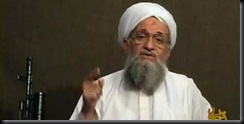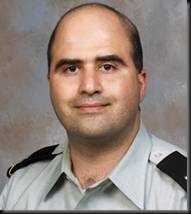The problem with homegrown terrorists? They just don't listen.
 Al Qaeda leader Ayman al Zawahiri / Reuters
Al Qaeda leader Ayman al Zawahiri / Reuters Al Qaeda, its ability to lead more conventional operations curtailed, is increasingly emphasizing "individual jihad" -- the theory that Muslims around the world, and especially in the United States, can be induced to take up arms and strike out at Western targets without receiving money, training, or so much as a pat on the back from the Al Qaeda organization proper.
On paper, this approach has some advantages. Operational security is a big problem for Al Qaeda these days. The terror network's top leaders and trainers are being hunted relentlessly, and their communications systems have been compromised. Just ask Osama bin Laden, whose e-mail habit led Navy Seals to his doorstep.
So the idea of a cadre of terrorists who can act on their own initiative is, to terrorist leaders, very appealing. The problem is that these new recruits aren't quite with the program, in ways large and small.
One element of the individual jihad that most homegrown terrorists can't seem to master is the part where you keep your mouth shut. It's been a recurring theme, highlighted explicitly by American Al Qaeda member Adam Gadahn and in recent issues of Al Qaeda's English-language magazine, Inspire:
We have witnessed that operations done by lone individuals has proven to be much more successful. So what can we learn from this? Group operations have a greater tendency of failing than lone operations due to the idea (of the operation) escaping the mind and tongue to other individuals. Even if those individuals are trustworthy in your eyes, there is still that 1% chance that someone from the intelligence agencies are listening in and paying attention to your groups' actions or that the person you are talking to might be working for the enemy or that he might be pressured at a later period to give information to them. With lone operations however, as long as you keep it to yourself, nobody in the world would know what you're thinking and planning.
Every single homegrown plot against the U.S. since September 11 that involved more than one person has failed, most often because law enforcement caught wind of it. Nevertheless, homegrown jihadists keep talking about their plans, and keep getting caught.
Although there are rare individuals who are capable of acting in complete isolation, jihad is ultimately a social and political activity. By its very definition, it is tied to an overwhelming sense of community with the global Muslim Ummah. Being a solitary jihadist is like being a solitary majorette. It's certainly possible, but you're likely to feel foolish marching around your basement in uniform.
The problem with individual jihad is, ironically, its individuality. Although loose lips are probably the most operationally significant manifestation of this failure to conform, it works on the ideological level as well.
For instance, Al Qaeda's leaders and its most visible propagandists have repeatedly drummed their justifications for killing American civilians. From an operational standpoint, civilian targets are easier to hit, but Al Qaeda also estimates that they make for more effective theater, driving home the point that no Americans are safe from the terror network's reach for as long as its list of grievances remains unsatisfied.
"Non-combatants are people who do not take part in the war," Yemeni-American Al Qaeda propagandist Anwar al-Awlaki said in a May 2010 video translated by MEMRI. "The American people in its entirety takes part in the war, because they elected this administration, and they finance this war [by paying their taxes]."
In late 2010, Inspire published an article by AQAP's resident scholar, 'Adil Al 'Abab, which reiterated the justification for attacking civilians. Earlier issues of Inspire suggested tactics such as driving a truck fitted with lawnmower blades into crowds of civilians and picking off any survivors with firearms.
There are only three cases where Awlaki is known to have provided specific operational guidance to would-be terrorists. All three were attempted airline bombings aimed at killing civilians: the 2009 Christmas day plot, the 2010 UPS cargo plane plot, and a 2010 effort to target British Airways.
Yet cognitive dissonance still creeps in.

Nidal Hasan / Reuters
American terrorists inspired by Awlaki have chosen to aim their fire far more discriminately. American Army officer Nidal Hasan -- the most successful of Awlaki's devotees -- carefully targeted people in uniform during his 2009 shooting spree at Fort Hood, deliberately turning away from civilians who were in the room when he started shooting.
Despite orders to target civilians, jihadist self-starters show a strong tendency to choose military targets. Though they might be easier for a would-be terrorist to justify, they're also much harder to hit.
About a third of all American jihadist terrorists arrested since September 11, 2001, were believed to be planning to attack U.S. military targets at home or abroad, according to a recent project from the New America Foundation and to my own research.
Eleven American jihadist terrorist plots have targeted military installations on U.S. soil during the same time frame. In seven cases, conspirators targeted the military exclusively, specifically avoiding civilians. (Individual jihadists overseas have also followed suit, although the pattern is weaker there.)
The two most recent examples came to light last month. A Marine reservist arrested in June while carrying explosives in Arlington National Cemetery was subsequently identified as a suspect in a series of shootings that had caused property damage at five military facilities in 2010. Just days after that arrest, the FBI disrupted a plot to stage a Mumbai-style commando attack on a military enlistee processing office in Seattle.
Abu Khalid Abdul Latif, the Seattle ringleader, was adamant about targeting the military. An FBI affidavit released after his arrest shows that, at first, he discussed hitting Joint Base Lewis-McChord. Later, the target was changed to an office that processed new military enlistees. His guidelines for the attack were very specific -- kill anyone "in green" or wearing a military haircut, but no civilians.
Members of the Fort Dix Six, who had listened to Awlaki's recorded lectures, also wrestled with the question of whether to attack civilian targets before settling on their eponymous plan to assault Fort Dix in 2007. They turned it over endlessly in their conversations, considering whether to attack federal buildings or even an airport. Although they knew attacking a military base would be immensely more difficult than targeting a civilian center, they decided (among other considerations) that killing civilians was un-Islamic.
News coverage usually refers to these plots as "targeting the military." But, more than that, they are actively refusing to target civilians, mostly for moral and religious reasons. The conversations observed by law enforcement surveillance show a process of ruling out civilian targets, as opposed to simply settling on military targets.
Despite a relentless campaign of religious and political argument, Al Qaeda has failed to sell its complete package of ideology and tactics to more than a tiny handful of American Muslims -- even those so angry about U.S. policies that they are willing to carry out extraordinary acts of violence with little hope of personal survival.
Since September 11, 2001, Al Qaeda has become increasingly decentralized, an evolution driven partly by choice and partly by circumstance. That change has created important divisions and highlighted the terror network's failures of both tactical logic and social nuance.
The homegrown jihad movement has shown signs of growth in recent years, but its adherents are starting to look less like Al Qaeda. They think for themselves, and the gap between what Al Qaeda wants and what its handful of American sympathizers are willing and able to do appears to be growing.
By opening its elitist movement to popular participation, Al Qaeda has introduced cracks into the moral absolutes that it uses to justify its bloodthirsty excesses. The cracks are small so far, and it's too soon to predict where all this might end, but I suspect they are only going to widen with time.
read more:
http://www.theatlantic.com/international/archive/2011/07/why-us-terrorists-reject-the-al-qaeda-playbook/242019/
